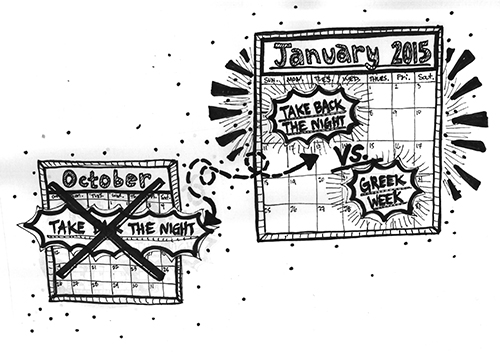The staff editorial is the majority opinion of The Murray State News Editorial Board.

Take Back the Night is a campus tradition that promotes the awareness and prevention of sexual assault. Typically held in September, students join together for a candlelight vigil and listen to stories of those who were victims.
However, Take Back the Night is now scheduled for March 30, six months later than in previous years. The change was made because March is Kentucky’s sexual assault awareness month, but this could ultimately hurt the promotion of the cause at Murray State.
New students who are trying to acclimate to campus attend events earlier in the year. After the fall semester is over, many students will graduate or have found another niche somewhere else in campus life like a club or intramural sport.
With most seminars, classes and discussions happening this month, the newly scheduled Take Back the Night takes place far after the other events about sexual assault, so it is less likely to have as high of a turnout.
The event will take place during Greek Week. Some sororities and fraternities make Take Back the Night mandatory, so Greek attendance will be high, but the same standards do not apply to non-Greek students.
These students will probably assume Take Back the Night is a Greek-exclusive event and decide not to attend, despite the message being relevant for all students. Awareness should be as inclusive as possible.
There is the issue of having two important events taking place at once. Will the excitement of Greek Week take away from the message that Take Back the Night tries to send? Scheduling Take Back the Night during Greek Week could also potentially group sexual assault with Greek activity, which isn’t fair to students in those organizations. Sexual assault awareness is a message that we should want to push and include everyone as much as possible.
Take Back the Night will feature bystander intervention stories, because most sexual assaults can be prevented when a bystander intervenes.
Bystander intervention stories will replace the victim stories shared in past Take Back the Night demonstrations. It’s refreshing that the event will change from past presentations, but both victim stories and intervention stories are equally important for the event.
The message that sexual assault is emotionally damaging is an important one for us all to hear. Seeing and hearing people talk about their experiences and pain resonates more than reading a pamphlet about sexual assault in a waiting room.
Sexual assault awareness, especially on a college campus, should be promoted. Students should encourage their friends and partners to attend Take Back the Night. We also hope that the change in time will not dilute the importance of this message.
Just because students are not required to attend seminars about sexual assault doesn’t mean they shouldn’t feel obligated to join those who are. Everyone can learn something valuable from Take Back the Night, whether it be how to respect others, prevent an assault from happening or avoid risk factors that lead to sexual assault.
Though it is six months away, students should make a point to attend Take Back the Night to educate themselves.